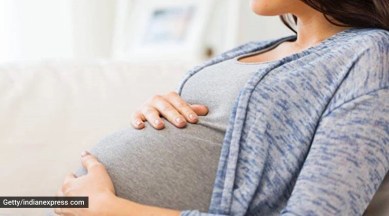📣 For more lifestyle news, click here to join our WhatsApp Channel and also follow us on Instagram
Understanding the link between maternal eating disorder and increased risk of premature birth
"The risk of having hypertension, miscarriage, difficult labour, premature delivery and intrauterine growth restriction are higher in pregnant women with anorexia nervosa," said Dr Fessy Louis T, Clinical Associate Professor, Amrita Fertility Centre, Amrita Hospital

It needs no retelling that women need to take extra care of their health during pregnancy to ensure the well-being of their babies. They also need to undergo various tests to diagnose any previously undiagnosed condition, so that timely treatment can be sought and understand if there are any risks involved. In a similar vein, a study recently highlighted that pregnant women diagnosed with anorexia nervosa, an acute eating disorder, are five times more likely on average to have underweight babies. Also, these women were more likely to have another psychiatric problem in addition to their eating disorder, to be smokers, to have thyroid disease, to be white, or of higher income, the study noted.
The study’s results, presented at the 38th Annual Meeting of ESHRE, also showed a substantially increased risk (298%) of premature birth and more than double the likelihood (341%) of placental abruption as compared to mothers without anorexia, which is often a life-long condition.
monthly limit of free stories.
with an Express account.
To understand more, we reached out to experts who told us about anorexia nervosa, and how it is linked to adverse pregnancy outcomes.
Anorexia nervosa is an eating disorder, characterised by self-starvation and excessive weight loss resulting in an incapacity to maintain the body weight within 85% of ideal body weight, explained Dr Fessy Louis T, Clinical Associate Professor, Amrita Fertility Centre, Amrita Hospital. Talking about the effects of anorexia on pregnancy, he said, “The risk of having hypertension, miscarriage, difficult labour, premature delivery and intrauterine growth restriction are higher in pregnant women with anorexia nervosa.”
The expert added that women with anorexia nervosa were nearly twice as likely to have a stillbirth, with 30% likely to experience preterm birth, 70% likely to have a low birth weight infant, and 50% likely to have a small-for-gestational-age birth. “Anorexia nervosa is also associated with iron, folate, zinc, and vitamin A deficiencies, which may also contribute to worse outcomes,” he added.
Symptoms
Anorexia nervosa has behavioural, and emotional signs, besides certain physical ones. “While behaviour changes include binge eating, compulsive food habits, excessive exercising or extreme physical training, the emotional symptoms include anxiety, apprehension, or guilt, obsession with calories, and an intense fear of gaining weight. Some physical effects are poor weight, low blood pressure, loss of muscle mass, and irregular periods,” Dr Duru Shah, Founder and Trustee, Metropolis Foundation, told this outlet.
Management
According to Dr Duru, there are no clear guidelines on the management of anorexia nervosa, but it definitely requires a multi-disciplinary approach that involves an obstetrician experienced in managing high-risk pregnancies, along with a team consisting of a psychiatrist, a psychologist, a physician and a nutritionist.
“The primary aim of immediate treatment is to normalise nutrition levels and restore normal eating patterns. Another important thing to maintain a food diary monitored by a nutritionist. Keeping a track of the exact food consumed by the patient enables the doctor to suggest changes that will help with slow, steady weight gain, and improve food tolerance. It is very important that the weight gain happens in a very gradual way and it should not exceed 0.5 to 1 kg per week,” said Dr Fessy.
The care should be more intensive during both prenatal and after delivery (post-natal period) because of the increased risk of developing postnatal depression, problems with breastfeeding and risk for relapse of the eating disorder, added Dr Duru.
📣 For more lifestyle news, follow us on Instagram | Twitter | Facebook and don’t miss out on the latest updates!
📣 For more lifestyle news, click here to join our WhatsApp Channel and also follow us on Instagram